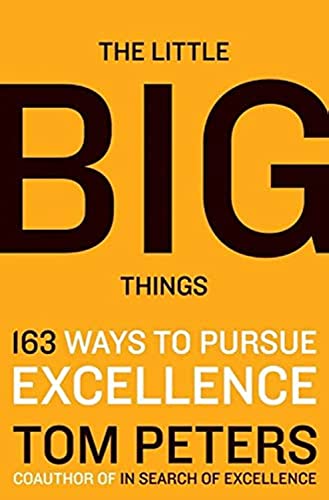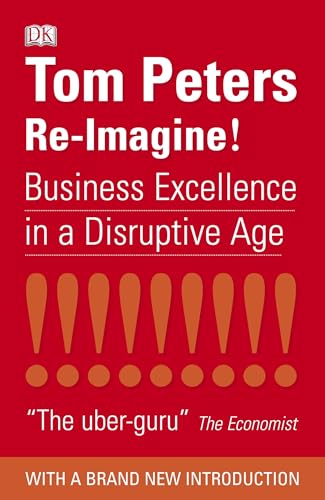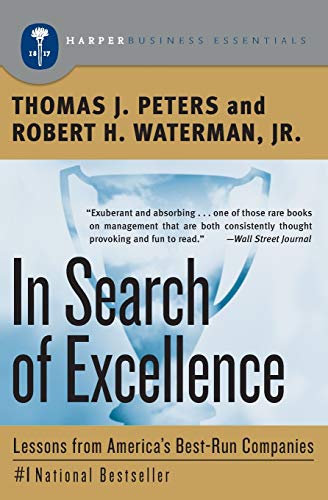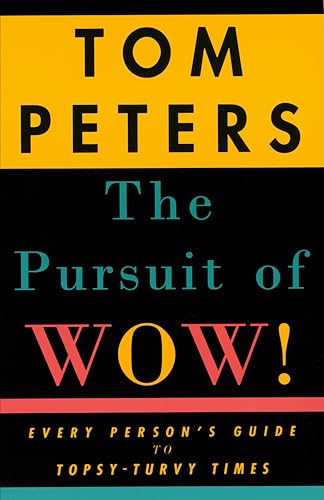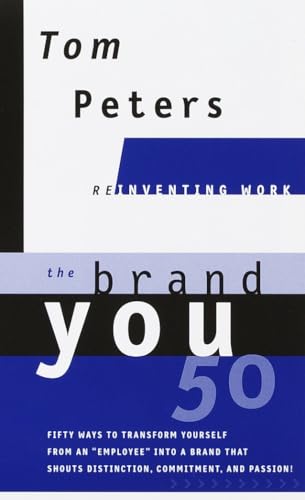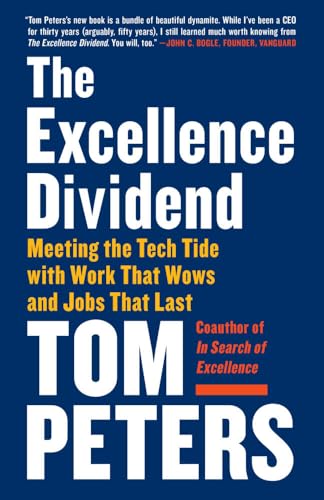Speaker's Profile
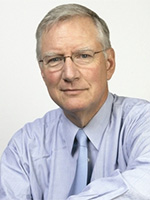
Tom Peters
One of the Most Influential, Business Thinkers of All Time
Almost thirty years after launching a management revolution, business iconoclast Tom Peters remains an irreverent, forceful voice—inspiring people to change the face of business.
FORTUNE called Tom Peters the “Ur-guru” of management (he doesn’t know what that means either, but admits “it sounds pretty good”) and compares him to Ralph Waldo Emerson, Henry David Thoreau, Walt Whitman and H.L. Mencken. The Economist tagged him the “Uber-guru” and BusinessWeek’s take on his “unconventional views” led them to label him “business’s best friend and worst nightmare.” The Bloomsbury Press book, Movers and Shakers: The 100 Most Influential Figures in Modern Business, reviewed the historical contributions of path-breaking management thinkers and practitioners, from Machiavelli and J.P. Morgan to Peters and Jack Welch. The summary entry on Peters’s impact:
“Tom Peters has probably done more than anyone else to shift the debate on management from the confines of boardrooms, academia, and consultancies to a broader, worldwide audience, where it has become the staple diet of the media and managers alike. Peter Drucker has written more and his ideas have withstood a longer test of time, but it is Peters-as consultant, writer, columnist, seminar lecturer, and stage performer-whose energy, style, influence, and ideas have shaped new management thinking.”
Without much doubt, Drucker and Peters have shaped the idea of modern management more than any others over the last six decades. Drucker is said to have “invented” management as a discipline worthy of study-in particular, he gave management of large firms the essential tools to deal with their post-World War II enormity, complexity and growing global reach. Peters, in turn, led the way in preparing management for the current era of staggering change, starting in the mid-1970s.
In particular, in 1982, with the publication of In Search of Excellence, Peters and Bob Waterman helped American firms deal with a crushing competitive challenge to their primacy by urging them to get away from strategies based on just the numbers and re-focused on the basic drivers of all successful businesses throughout time: people, customers, values-“culture” (“the way we do things around here”), action-execution, a perpetual self-renewing entrepreneurial spirit. As “obvious” as these ideas are, they were, are and always will be the bedrock and differentiator of excellent enterprise-and subject to constant and remarkably rapid slippage if left untended for even a moment.
Peters and Waterman also effectively introduced the world of business to the notion of Excellence per se, a state of mind and daily practice not normally associated with enterprise and an inspiring and pragmatic and profitable aspiration. In short, then and now, the unwavering pursuit of Excellence, from the finance department to after-sales service, in the car dealership and police department as well as the bank branch and aircraft factory, provides the basis for an unmatchable competitive advantage-and acts on one and all as an ongoing spur to path-breaking achievement. And in our global village, getting flatter by the day as it is, Excellence is a universal idea-ideal (think Olympics) that translates and transports across all borders.
In 1999, In Search of Excellence was honored by NPR as one of the “Top Three Business Books of the Century;” it was ranked as the “greatest business book of all time” in a poll by Britain’s Bloomsbury Publishing and was the most widely held library book in the United States from 1989 to 2006. Peters has followed Search with well over a dozen additional international bestsellers. Among them: A Passion for Excellence (with Nancy Austin); Thriving on Chaos; Liberation Management (acclaimed as the “Management Book of the Decade” for the ’90s); a series of three books in 1999 on the new world of work, including the landmark The Brand You 50 and in 2003 the provocative, colorful Re-imagine: Business Excellence in a Disruptive Age. Along the way, several Tom Peters biographies have been published, including: Corporate Man to Corporate Skunk: The Tom Peters Phenomenon and Tom Peters: The Bestselling Prophet of the Management Revolution (part of a four-book series of business biographies on Peters, Bill Gates, Peter Drucker and Warren Buffett).
Peters, who is widely credited with almost single-handedly “inventing” the public “management guru industry,” now global in scope and billions of dollars in size, writes, reflects, and then presents about 30 seminars each year, well over half outside the U.S. (In a four-week period in 2009, he spoke in Korea, Mexico, Turkey, Argentina and Croatia.) Peters estimates that since 1978, when the work on Search began, he’s given well over 2,500 speeches, flown 5,000,000+ miles, spoken before 2,000,000 to 3,000,000 people and presented in 48 states and 67 countries. Also, since 2004, Peters has devoted significant “at home” energy to the award-winning blog—www.tompeters.com (a “Top 500” blog designation and 9th ranked among the “Top 150 Management & Leadership Blogs”) and beginning in 2009 he has actively engaged his global network via Twitter (where he has also made various “top sites for …” lists).
Leadership guru Warren Bennis, the only person close to both Peters and the late Peter Drucker, told a journalist, “If Peter Drucker invented modern management, Tom Peters repainted it in Technicolor.” In fact, as even Peters’ book titles indicate (“Excellence” … “Passion” … “Liberation”), his passion is passion: destruction & re-imagining … finding and liberating (“beyond measure”) talent for a hypercompetitive world … the Herculean task of sustaining entrepreneurial excellence even in enormous organizations … an enterprise-wide obsession with design that produces products and services of the sort that Steve Jobs calls “insanely great.” Among Peters’ newer campaigns are: women-as-leaders especially suited for these times; gaining advantage in the enormous, underserved markets represented by women (who control most of the developed world’s wealth) and among the burgeoning, financially potent and absurdly underserved boomer-geezer population in the likes of North America, Europe and Japan and a fixation on safety and operational and patient-focused Excellence in our biggest industry, healthcare.
As we were engulfed by the economic crisis in 2008, Peters once again shifted gears, perhaps downshifted renewing his dedication to what he labels the “eternal basics” of implementation-execution, among other things a topic of research he pioneered at Stanford in the 1970s. “We create and then get caught up in, me included, an endless parade of fads,” he says, “but while the world is indeed changing, the basics of ‘getting things done through people,’ my great passion, remain the same as they were a hundred, or hundreds, of years ago-and it is failures in implementation that trip us up in 9 cases out of 10, from a primary school in Nashville or Nigeria to ‘nation-building’ in Basra and Baghdad. In business, for example, developing a brilliant ‘blue ocean strategy,’ today’s hot buzz phrase, is all well and good, but make no mistake, engaged and enthusiastic people executing like maniacs in that ocean is the only thing that will keep it blue and keep you sailing with spinnaker full! ‘Excellence in Execution’ was, is, wherever and forever will be Sustainable Competitive Advantage #1.”
This recent emphasis/re-emphasis was marked in March 2010 by HarperCollins’ publication of Peters’ The Little BIG Things: 163 Ways to Pursue Excellence. The book, praised by leadership guru Warren Bennis as “the best management book I have ever read,” is indirectly derived from Peters’ observations at tompeters.com; it ranges far and wide, discussing everything from the impact of clean restrooms in retail to the power of apology to the sources of human resilience to observations on the economic crisis of 2007++. Though applicable in any circumstance, it is primarily aimed at maintaining one’s wholehearted commitment to Excellence in difficult times riven with uncertainty and ambiguity.
Born in Baltimore in 1942 “with a lacrosse stick in one hand and oars over my shoulder,” Peters resided in California, mainly Silicon Valley (where he was on a list of “100 most powerful people in Silicon Valley”), from 1965-2000. Today, Peters and his wife Susan Sargent, textile designer and icon in the home furnishings industry, live on a 1,600-acre working farm, “always under construction,” in Vermont. His two stepsons, Max and Ben Cooper, are “busy changing the world” in Telluride and Brooklyn respectively.
Peters is a civil engineering graduate of Cornell (B.C.E., M.C.E.), where he included in the book The 100 Most Notable Cornellians and earned an MBA and Ph.D. in business at Stanford; he holds honorary doctorates from institutions that range from the University of San Francisco to the State University of Management in Moscow—and has been honored by dozens of associations in content areas such as management, leadership, quality, human resources, customer service, innovation, marketing and design. In the U.S. Navy from 1966-1970, he made two deployments to Vietnam (as a combat engineer in the fabled Navy Seabees) and “survived a tour in the Pentagon.” He was a White House drug-abuse advisor in 1973-74 and then worked at McKinsey & Co. from 1974-1981, becoming a Partner in 1979; he also co-founded McKinsey’s now gargantuan Organization Effectiveness practice. Peters’ chief avocations are “brushcutting in the summer, hiking in New Zealand in the winter, reading history books by the hundredweight, collecting weird friends, talking to cab drivers, visiting Venice and racing George Clooney in accumulating frequent flyer miles.”
TOPICS
More Than Just A Speech
When you engage Tom Peters for one of the presentations described below, you get more than just the talk. Following his presentation Peters will provide, at no additional cost, an executive session where your VIPs and/or top executives will meet and interact in a unique leadership chat. This informal “no-need-to-prepare” forum allows leaders to pose questions about the challenges they’re facing and, with Peters as catalyst, discover new strategies for leadership and career success.
Excellence: Continuing The Search
2007 marked the 25th anniversary of the publication of one of the most influential business books ever written: Tom Peters and Bob Waterman’s In Search of Excellence. Upon publication, the book immediately ushered in a management revolution, forever changing the way entrepreneurs and leaders viewed their relationships with their employees and customers. In the book, the authors reemphasized what Tom calls the “obvious ideas”: the paramount importance of an abiding orientation toward action over talk, matchless customer intimacy, a wholehearted devotion to acquiring and developing the best talent, entrepreneurship spurred internally, the ever-difficult task of “keeping it simple,” and leadership as “a product of passion, passion, passion.” These ideas are now considered “standard operating procedure” in businesses around the world—though often implementation does not live up to the standards practiced by the world’s best.
In this compelling presentation, Peters revisits and boldly extends the ideas that helped make In Search of Excellence a watershed event in both business and publishing—and launched the now mammoth “management guru industry.” Admitting that “the older I get, the less boring these ‘basics’ such as ‘people first’ become,” Peters says that these same ideas “that led us to take a gamble on Wal*Mart in 1982 animate the likes of Google, Starbucks and Commerce Bank today. In fact, the 100% implementation of these ideas is far more important—for survival’s sake—than it was 25 years ago.”
This presentation promises to inspire audiences of any type, anywhere. Peters’ own passion and intensity, audiences around the world report, has only grown with the passage of time.
Ways to tailor this presentation:
- Building an “Innovation Machine:
In uncertain times like ours, innovation is inarguably top management’s Job One. Strategies and tactics and cases are offered to abet creation of an abiding “Culture of Innovation.” - The Pursuit of Excellence in Health and Health Care
In the last 36 months, healthcare has become Peter’s passion and obsession. Not the legislation, but his longterm abiding interest in operational excellence and a culture of Excellence. His focus is primarily patient safety, patient-centered care and home care/chronic-care associated with the rapidly aging population. Evidence-informed medicine and over-treatment are also areas of his intense study; the latter of course does coincide with reimbursement policy. As usual, Peter’s believes in experimenting your way to Excellence—the good news is that regardless of the law, numerous institutions of all sorts are experimenting aggressively with new approaches to achieving operational excellence. Peter’s sees this experimentation foreshadowing the most exciting-revolutionary decade of re-orientation in healthcare management practices—again, regardless of legislation and the new science. - Talent Time!
It’s the people, stupid! Well, of course, it’s always been the people; but with a new value equation that puts dramatically more emphasis on innovation and creativity and NASA-like “to the moon” projects and multi-enterprise co-operation, talent (big word!) is more important than ever. Strategies and tactics are offered for taking a fresh, radical re-look at the “people (talent!) dimension.” Peters comes at this “bottom up,” focusing on what he calls “Brand You”—instilling an entrepreneurial attitude and penchant for excellence in every employee.
Re-imagine: Business Excellence in a Disruptive Age
Background: All bets are off … a brief tour of dramatic forces at work, from changing technologies and demographics to the rise of China and India and the profound effects of a new corporate risk profile. Strategies and tactics are laid out for accomplishing necessary, radical enterprise change. Plus: A “how to” for creating perpetually adaptive enterprises—ready for anything, prepared to turn on a dime. “The very ‘metabolism’ of the enterprise must be altered,” Peters says. In that vein, Re-Imagine! discusses:
- Wildly altered context (technology, China-India, global terrorism, etc)
- Only answer: adaptive skills and bold-breathtaking innovation (top-line focus rather than cost-cutting focus)
- Race way, way up the value-added curve (implemented “game-altering solutions” rather than “services,” “experiences” rather than “transactions,” and much more)
- As part of value-added exercise, pursue Ripe & Enormous “new” markets—Women, Boomers & Geezers
- Radical (!!!) use of IS-IT
- A “Roster” of Weird & Wondrous & Entrepreneurial “Talent” engaged in “Wow Projects”
- “Metabolic Leadership” (Passionate-Radical Leaders who instill a Discipline of Execution, a Quick Tempo-Adaptive Culture and an appetite to “Eat Radical Change for Breakfast”)
Ways to tailor this presentation:
- A New World Order for Enterprise. Or: Re-imagine Everything!
This is to an extent re-statement. Tom Peters’ abiding theme-passion is energizing execs, in the public and private sectors, to attempt the bold leaps which he insists are survival requisites today. “I hope the view and approach I present is encompassing and original,” Peters says. “I know it is necessary.” - New Markets: Two Trends Worth Trillion$$$
There can be too much micro-slicing and dicing of markets, according to Tom Peters. In the process we often overlook huge opportunities. Peters has identified what he labels “the two most glaring deficits in the markets/marketing portfolio.” They are the need to pay far more attention to women as purchasers of consumer and commercial goods and services; and leaping on the boomer-geezer express. - Getting Things Done
Tom Peters declares that we spend too much time planning, not enough time-thought on execution. Implementation can be addressed as a stand-alone topic or part of any of the above effective strategies and tactics for getting things done. Peter’s unconventional approach to project management is a mainstay of this presentation. - A Passion for Passion
Peters calls this his “motivation speech.” “My passion is for passion,” he declares, “for energy and enthusiasm and boldness and guts and the willingness to screw up and then get up. This is part and parcel of all I present, but also a stand-alone topic. The idea is not, ‘This is cool.’ The idea is, ‘This is requisite in wildly gyrating times like ours.’ ”
Surviving and Even Thriving Amidst the “Perfect Storm”
While many businesses will fail amidst the current economic crisis through no fault of their own, some will survive in spite of the odds—and a few will surprise everyone by turning a messy situation into economic-competitive advantage. Tough times are, in fact, golden opportunities to get the drop—and the long-term drop at that—on those who respond to bad news by panicky across-the-board slash and burn tactics and moves that de-motivate and alienate the workforce at exactly the wrong moment.
Tough times, indeed, require tough decisions—but thriving, not just surviving, is an option for those who mix the wisdom and boldness of leadership along with transparency and maximized employee involvement and engagement. Without suggesting that there is anything humorous about the pain that bad times cause, one could say that “this is when it gets fun” for truly talented and imaginative leaders at all levels and in businesses of every sort and size.
(Tom’s aptly-named book, Thriving on Chaos, published on the day the stock market crashed in 1987, suggests his extensive familiarity with the possibility of success in uncertain times.)
Ways to tailor this presentation:
- Leadership (Or: Leading in Totally Screwed-up Times!)
Developed a couple of years ago and honed ever since, Tom Peters calls it The Leadership50 — Fifty strategies and tactics for vigorous leadership in times of uncertainty. - Reinvention (Or: Twenty-seven Practical Ideas that will Transform Every Organization)
A concise, yet insightful and entertaining guide to the things you should be doing to make lemonade out of lemons.
The Basics Are the Basics Are the Basics Are the Basics: The Worse the Times, the Better They Work
The “engine” of the current economic mess is losing total touch with the basics: that is, lending money to people, by the millions in the end, who “obviously” couldn’t pay it back. In many ways, that is the whole story—at the bottom of the bottom of the bottom of the pile of derivatives of derivatives of derivatives are truly stupid loans that any fool would say should never have been made.
- We get in trouble when we forget the basics.
- We get out of trouble when we remember the basics.
- We stay out of trouble when we become perpetually “insane” about the basics.
Peters wrote the book that spawned a management revolution because we placed too much emphasis on sophisticated “MBA thinking” and not enough emphasis on the stuff that led over a thousand people to show up for his grandfather Owen Snow’s funeral in little Wicomico Church, Virginia, over a quarter of a century ago.
Grandfather Owen had run a country store and he’d been counselor, banker, and friend, as well as shopkeeper, to thousands over the years. He was a math whiz (he passed a bit of that on to me), but those thousands showed up at his funeral because he never forgot the basics of taking the time to listen and putting people first!
The great news for today: The worst of the worst can be managed if we remember, and assiduously apply, the principals of Peters’ grandfather:
Does that sound simplistic?
Perhaps.
But remember: We’re deep in doggy doo-doo because of nothing more than lending money to people who obviously (!!!) couldn’t pay it back.
********
A CEO of a mid-sized bank attended a seminar of mine in Northern California many years ago—but I remember the following as if it were yesterday. I’ve forgotten the specific context, but I recall him saying to me, “Tom, let me tell you the definition of the good lending officer. After church on Sunday, on the way home with the family, he takes a little detour to drive by the factory he just lent money to. Doesn’t go in or any such thing, just drives by and takes a look.”
Amen.
If you were interested in this speaker’s availability and fee, please contact at here.









